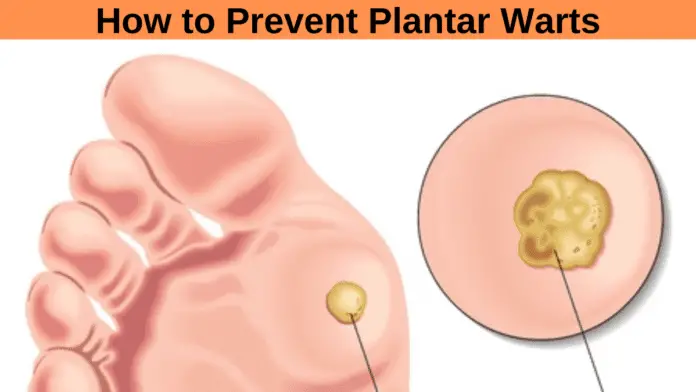
Plantar warts are hard, grainy skin growths that occur on the bottoms of feet. They’re caused by the human papillomavirus (HPV) and can be painful if left untreated. If you’re looking for ways to prevent plantar warts, this comprehensive guide will help you understand how they’re contracted, what treatments are available, and finally how to prevent plantar warts.
How Do You Contract Plantar Warts?
Plantar warts occur when the HPV virus enters your body through small cuts or breaks in your skin. The virus thrives in warm, moist environment so it often spreads in places such as locker rooms and public swimming pools. It is also possible to contract plantar warts from direct contact with an infected person or from touching an object that has been exposed to the virus.
Ways To Treat Plantar Warts
If you have plantar warts, there are several treatment options available. One of the most popular treatments is cryotherapy which involves freezing off the wart using liquid nitrogen. Other treatments include topical creams, salicylic acid peels, laser therapy or surgical excision. It’s important to visit a podiatrist or dermatologist if you think you have plantar warts so they can recommend the best treatment option for you. Read: Do Plantar Warts Go Away on Their Own?
Does The HPV Vaccine Prevent Plantar Warts?
The HPV vaccine is designed to protect against certain strains of the HPV virus which is known to cause cervical cancer in women and genital warts in both men and women. While it does not prevent all types of HPV infections nor does it guarantee that you won’t get plantar warts, research has shown that getting vaccinated can reduce your chances of contracting certain strains of HPV that are linked to plantar warts and other forms of cancer. It is recommended that both boys and girls receive the vaccine at age 11-12 as part of their routine immunizations schedule.
Read: Are Plantar Warts Contagious?
How to Prevent Plantar Warts: 6 Quick Tips
Plantar warts are a common skin condition caused by the human papillomavirus (HPV). They usually appear on the soles of the feet and can be painful and unsightly. While plantar warts are not usually serious, they can be difficult to treat and may take several months to go away. The good news is that there are several things you can do to prevent plantar warts from developing in the first place.
Tip 1: Protect Your Feet
The HPV virus thrives in warm, moist environments like public pools, locker rooms, and showers. To reduce your risk of getting plantar warts, always wear shoes or sandals in these areas. Avoid walking barefoot in public places where other people have been walking barefoot.
Tip 2: Keep Your Feet Clean and Dry
Wash your feet every day with warm water and soap. Dry them thoroughly, especially between your toes. Moisturize your feet regularly to prevent dryness and cracking, which can make it easier for the HPV virus to enter your skin.
Tip 3: Don’t Share Personal Items
The HPV virus can spread through contact with infected skin or objects like towels, socks, or shoes. Avoid sharing personal items like these with others, especially if you have a plantar wart or other skin condition.
Tip 4: Boost Your Immune System
A strong immune system can help fight off the HPV virus before it has a chance to cause a plantar wart. Eat a healthy diet rich in fruits and vegetables, get enough sleep, exercise regularly, and manage stress to keep your immune system functioning at its best.
Tip 5: Treat Existing Warts Promptly
If you already have a plantar wart, cover it with a clean bandage or athletic tape to prevent it from spreading to other parts of your foot or other people. See a healthcare provider for treatment options such as cryotherapy (freezing), laser therapy or topical medications.
Tip 6: Consider Getting Vaccinated Against HPV
The human papillomavirus vaccine is designed to protect against certain strains of HPV that can cause genital warts and some types of cancer. While there is no specific vaccine for preventing plantar warts alone, getting vaccinated against HPV could reduce the chances of developing any type of wart, including plantar warts.
Final Takeaway!
Plantar warts can be uncomfortable and even painful if left untreated but thankfully there are several methods for treating them such as cryotherapy, topical creams, laser therapy or even surgery depending on their severity. Additionally there are some preventive measures one can take such as wearing shoes in public places, avoiding direct contact with someone else’s skin lesions and practicing good hygiene habits like washing hands regularly especially after coming into contact with any potential sources of infection like door handles etc.. Furthermore getting vaccinated against certain strains of HPV may reduce your chances of contracting those viruses which may lead to developing plantar warts later on down the line so it is worth considering getting vaccinated if eligible especially since its available free for children aged 11-12 years old as part of their routine immunization schedule. Follow these steps carefully to help keep yourself safe from contracting plantar warts!












[…] Read: How to Prevent Plantar Warts: 6 Quick Tips […]